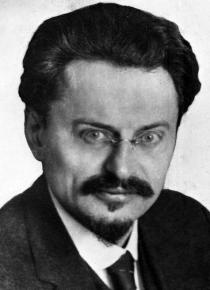A resource for our time
explains why the writings of Trotsky, Luxemburg and Lenin belong on every activist's bookshelf.
LEON TROTSKY'S Writings from Exile is the last volume of a trilogy that I have helped to edit and introduce. The three books provide selections from the revolutionary writings of Leon Trotsky, Rosa Luxemburg and Vladimir Ilyich Lenin.
The title of the Lenin volume, Revolution, Democracy, Socialism, highlights the intertwined aspirations of all three. Socialism or Barbarism, the title of the Luxemburg volume, emphasizes the grim alternative that we face today, "in exile" from a hoped-for better future that these three comrades had struggled for.
Two of the three were murdered by the forces of tyranny and inhumanity that they dedicated their lives to overcome. Yet the ideas provided by all three, rooted in the struggles and experiences of a massive international workers' movement, are alive in what they wrote.
It is obvious that anyone hoping to understand the history of the labor and socialist movements, and the triumphs and tragedies of the 20th century, must have an understanding of the lives and ideas of Trotsky, Luxemburg and Lenin. But it is has also been my belief, while helping to bring these three books into being, that they are of more than historic interest. They are a resource for our own time.

Our lives are being lived in a global reality of chaos and multiple crises. Amid the ups and downs of the present moment, I look back on the decades in which the quality of life for the majority of us has been getting worse--despite the fact that life seems to be very, very good for the wealthy and powerful 1 percent.
Yet even the 1 percent is worried. Some of the most perceptive of the elite are worried about the actual problems confronting humanity, but they are also worried about us. And some of us--the 99 percent--have a sense that our time has come.
TROTSKY, THEORIST and symbol of permanent revolution, once explained that revolution means "the direct interference of the masses in historic events," elaborating that "at those crucial moments when the old order becomes no longer endurable to the masses, they break over the barriers excluding them from the political arena, sweep aside their traditional representatives, and create by their own interference the initial groundwork for a new regime."
That new reality to which Trotsky refers is one that we are very, very far from: a time when there will be rule by the people over our political and economic life, in which all share in the labor, and in the fruits of our labor, that can provide a life of dignity, free development and creativity for each person.
Some of us call that "socialism" or "communism"--once-glowing words that have so often been distorted and corrupted and turned into their opposite. But regardless of labels, it is a glowing vision that has animated insurgencies and occupations, mass protests and momentous revolutions of the past and of our own time.
The future that we hope for and so badly need will not come automatically, but only through the hard work of hundreds, thousands, ultimately millions of people around the world. To the extent that our struggles are blind, however, we cannot achieve what we hope for. The passion of today must be fused with a deepening knowledge:
-- of the structures and dynamics of power, oppression, and exploitation in our own time,
of how things came to be this way,
of the popular struggles that were capable of winning life-giving victories,
of what went wrong with those struggles and the reasons why, and
of the achievements and possibilities on which we can build even more successful struggles.
The powerful forces arrayed against us are inevitably pushing back in multiple ways against the mass protests and insurgencies that threaten them. Now more than ever, activists committed to making the world a better place must draw on all possible resources to overcome the repression and co-option, lies and corruption, force and violence which the one percent employs to defend its power and privilege.
There is much to be done to resist such things, and to build powerful mass movements, organizations and struggles to secure--more and more--the freedom and decent life that are the right of each and every person. Trotsky, Luxemburg and Lenin are by no means the be-all and end-all of knowledge and wisdom, and they never claimed to be.
The power of their ideas was inseparable from the richly endowed traditions and mass movements of the working class, animated by the diverse contributions of many who struggled against oppression. Yet I believe that today's organizing efforts and freedom struggles will be made stronger by engaging with the writings of these three revolutionaries.
First published at the Pluto Press blog.


